LIBRA - The Scales
September 24- October 23
SYMBOL - The Scales
ELEMENT - Air
QUALITY - Cardinal
RULING HOUSE - Seventh
PLANET - Venus
QUALITIES
Charismatic
Gentle
Good Looking
King
Stylish
Romantic
Easygoing
Intuitive
LUCKY COLOUR - Blue & Pink
LUCKY STONE - Opal
LUCKY DAY - Friday
LUCKY NUMBER - Six
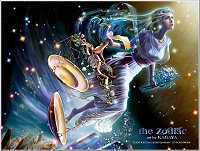
Libra
By Kagaya
CLICK TO ENLARGE
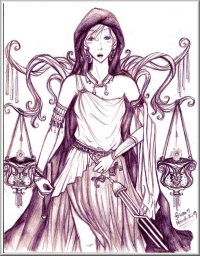
Dike, Goddess of Justice
by Friesse
CLICK TO ENLARGE
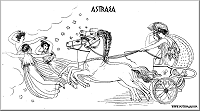
Astraea
CLICK TO ENLARGE
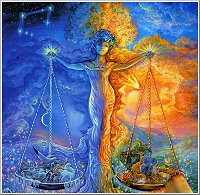
Libra
by Josephine Wall
CLICK TO ENLARGE
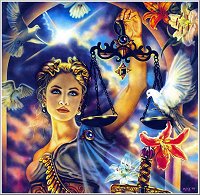
Libra
Artist Unknown
CLICK
TO ENLARGE
Libra is the seventh sign of the
zodiac, and it's at this point in the zodiac that we
start to see a shift. While the first six signs of the
zodiac focus on the individual, the last six focus on
the individual's contact with others and with the world.
Libras are first and foremost focused on others and how
they relate to them. We can call this the sign of
Partnership with a capital 'P' because these folks do
not want to be alone! For a Libra, everything is better
if it's done as a pair. Libras are good when paired up,
too, since they epitomize balance, harmony and a sense
of fair play.
While they are true team players at work,
their favorite partnership is at home: marriage. Libras
feel most complete when they are coupled up with their
lover, forever.
It's the Scales that symbolize Libra, and just like that
balancing mechanism wants to stay even, Libras want to
be on an even keel. Think of the Scales of Justice and
how they work at striking the right balance. Likewise,
Libras are objective, just and want to do what's best
for everyone.
It's possible, though, that this penchant
for fairness is for a different reason: Libras abhor
conflict. The scales study every possible angle in the
hopes of achieving peace and harmony, so much so that
others may see them as fickle and indecisive. If that's
what it takes to avoid a confrontation, that's fine with
the Scales.
The Libra-born are keen strategists,
organizing groups with poise and getting the job done
(in keeping with the Cardinal Quality assigned to this
sign). Further, you can expect the Scales to be
companionable, sociable folks.
© astrology.com |
|
Astraea (Greek: Ἀστραῖα;", meaning "star-maiden", not to
be confused with Asteria, a star goddess) was a
daughter of Zeus and the Titaness Themis, who was the Olympian
god's second consort and goddess of Justice. Both Astraea and
her mother were ancient personifications of Justice, along with
the Greek goddess Dike.
More associated with innocence and purity than her mother,
Astraea determined whether departed souls could enter the
Elysian Fields, there to find eternal bliss, or if instead they
would be consigned to the dreaded Underworld, there to join
other disconsolate Shades.
Some consider her the daughter of Astreus and Eos, goddess of
the Dawn. Astraea is often depicted as a winged woman, carrying
a torch and the scales of justice, and was said to have assisted
Zeus on the battlefield -- she is even portrayed carrying his
lightning bolts, in the form of 'Astrape'
(Lightning), a very rare honor.
Now, you will hear people call her the "virgin goddess", and
that has led to much confusion between the major constellation
myths of Libra the Scales and Virgo the Virgin.
Some claim that the woman holding the ear of corn in Virgo is
Astraea, not Persephone. The scales of justice that glide by her
side in the zodiac are her scales. The two never leave one
another's side, forever connecting the two constellations within
a single mythology.
Astraea was the last of the Immortal gods to live among humans,
taking the Golden Age along with her when she departed for Mount
Olympus to join Zeus and the other deities
As the turning Wheel of
the Ages inexorably moved into darker times, Astraea remained behind on
earth to offer hope and guidance to the quickly-degrading humanity.
To better understand her balancing role, let's take a quick peek at the
Five Ages of Man, which are the key stages of human existence on the
Earth according to Greek mythology.
The successive ages of humanity tend to progress from an
original, Utopian age, in which humans enjoyed a nearly divine
existence, to the current age, in which humans are beset by
innumerable pains and evils.
This degradation of the human
condition over time is indicated symbolically with metals of
successively decreasing value, with Gold being the loftiest and
Iron the basest..
Here are the Five Ages, according to Hesiod from 'Theogony':
 Golden Age: The best of times! It occurred within the
rule of Titan Cronus, prior to his violent and bloody overthrow by Zeus and the
Olympians. This age featured splendid humans magically molded
out of the earth by the loving hands of the Titan Prometheus. They
were said to live among the gods, and freely mingled with them.
Golden Age: The best of times! It occurred within the
rule of Titan Cronus, prior to his violent and bloody overthrow by Zeus and the
Olympians. This age featured splendid humans magically molded
out of the earth by the loving hands of the Titan Prometheus. They
were said to live among the gods, and freely mingled with them.
Peace and harmony prevailed during this age, for there was great
awareness of humankind's interconnectedness to each other, and
to Mother Earth. Those highly developed mortals recognized that
to kill is to be killed.
Humans did not have
to work to feed themselves during the Golden Age, for the earth provided food in
abundance. These noble people lived to a very old age but
amazingly they maintained a youthful
appearance and eventually died peacefully. Their spirits lived
on as "Guardians", or "Speakers", to guide and
instruct future generations.
The philosopher Plato recounts the golden race of men who came
first. He clarifies that Hesiod did not mean men literally made
of gold, but rather men who were upright and noble. He describes
these men as daemons upon the earth. These 'δαίμονες'
('daimones', meaning 'knowing' or 'wise'), were beneficent
and benevolent spirits , preventing illnesses and ill-will and watching over
mortals.
 Silver Age: The next four ages occurred within the
reign of Zeus, Lord of the Olympian gods.
Silver Age: The next four ages occurred within the
reign of Zeus, Lord of the Olympian gods.
Men in the Silver age lived for one hundred years
as juveniles under the dominion of their mothers. They lived
only a short time as grown adults, and spent that time in strife
with one another.
During this Age men arrogantly refused to worship the
gods or offer them righteous sacrifice and Zeus ended up destroying them for their impiety. After death,
humans of this age became "blessed spirits",
residing in the domain of Hades, the Underworld.
 Bronze Age: Humans during this period were hardened and
cruel, as war was their driving purpose and passion. Zeus
created these humans out of the ash tree. Their armor was forged
of bronze, as were their homes, and tools.
Bronze Age: Humans during this period were hardened and
cruel, as war was their driving purpose and passion. Zeus
created these humans out of the ash tree. Their armor was forged
of bronze, as were their homes, and tools.
The men of this martial Age
were undone by their own violent ways. They ended up destroying
themselves in their ignorance and left no named spirits;
instead, they dwell in the "dank house of Hades".
This benighted Age came
to an end with the great Flood of Deucalion, sent by Zeus
to punish offensive humans and give the earth a fresh start.
 Heroic Age: This age does not correspond with any
metal. It's also the only age that is an improvement upon the age it
follows. These humans were created from the 'bones of the earth'
(stones) through the actions of Deucalion and Pyrrha, sole
survivors of the preceding age's Flood.
Heroic Age: This age does not correspond with any
metal. It's also the only age that is an improvement upon the age it
follows. These humans were created from the 'bones of the earth'
(stones) through the actions of Deucalion and Pyrrha, sole
survivors of the preceding age's Flood.
In this period men co-inhabited the earth
with noble demigods and heroes. It was the heroes of this Age,
such as Hercules, Jason, Perseus, Theseus, Bellerophon,
Atalanta, Achilles and more,
who fought at Thebes and Troy and provided us
with most heroic myths.
This race of humans eventually died and was consigned
to Elysium, the Isle of the Blessed.
 Iron Age: During this current age humans live a drab
and unfulfilling existence of toil and misery. Children dishonor
their parents and brother quarrels with brother.
Iron Age: During this current age humans live a drab
and unfulfilling existence of toil and misery. Children dishonor
their parents and brother quarrels with brother.
Xenia (Hospitality) --
which involves the generosity and courtesy shown to those who
were far from home -- the sacred social
contract between guest and host is forgotten or ignored.
It's an age of brute force, where might-makes-right, and
evil
men use deception and duplicity to convince gullible humans that
they are righteous and moral, so that they can be fleeced and
exploited.
At the height of this Iron Age, humans no longer feel shame or
indignation at corruption and malignant wrongdoing; babies are born with gray hair
and the gods, filled with revulsion at such lack of pathos
and awareness, will have completely forsaken humanity. With the
deities absent,
"There
will be no defense against evil." (Hesiod)
Wow. Sure does sound like present times, doesn't it? Is
there hope?

Here's the poet Hesiod, lamenting the ignoble fall from grace:
"Would that I were not among the men of the Fifth Age, but
either had died before or been born afterwards. For now truly is
a race of iron, and men never rest from labor and sorrow by day
. . .
"And they will deteriorate over time so that: Strength will be
right and reverence will cease to be; and the wicked will hurt
the worthy man, speaking false words against him, and will swear
an oath upon them
Zelos (Envy), foul-mouthed, delighting in evil, with scowling
face, will go along with wretched men one and all."
With the dawn of the Iron Age quickly the world degenerated into a cesspool of increasing
ignorance and violence, and goddess Astraea grew weary. Unable
to tolerate any longer the greed, falsehoods, avarice and
general wickedness of the base humans, Justice, along with Aidos
(Respect), left earth for Mount Olympus.
And gods no longer dwelt on earth with mankind.
The poet Hesiod again aptly describes the scene as the last of
the deities make a hasty departure from earth:
"(the gods)...shrouding their bright forms in pale mantles,
shall go from the wide-wayed earth back to Olympus, forsaking
the whole race of mortal men, and all that will be left by them
to mankind will be wretched pain. And there shall be no defense
against evil."
Ovid offers his take in 'Metamorphoses' -- "Last came
the Race of Iron. In that hard age of baser vein all evil
straight broke out, and honor fled and truth and loyalty,
replaced by fraud, deceit and treachery and violence and wicked
greed for gain...Honor and love lay vanquished, Astraea, virgin
divine, the last of the Immortals, fled away."
But all was not lost! It is said that once humans came to their
senses and realized
what they had done, they hoped for her to return, inferring that
she would bring the Golden Age back with her. The poet Ovid
states:
"Iam redit et virgo, redeunt Saturnia Regna" -- "The Virgin
and the Days of Old return".
According to ancient legends, as the wheel of the ages turns
once again toward light, Astraea will return to Earth as an
ambassador of another Golden Age. Since she was the last of the
gods to leave, perhaps she will be the first to return as a
harbinger of a new dispensation and a revived awareness of
humanity's social obligation towards each other..
Some believe that Astraea's image is that portrayed on the
"Justice" card in the major arcana of the tarot. In the most famous rendition of
the card's artwork, a winged woman carrying a torch and
thunderbolts stands beside the throne of Zeus. The name "Astrape"
('lightning bolt')is inscribed above her.
Sounds like Astraea.
She is represented with the accoutrements of a star-goddess --
wings, bright aureole and flaming torch.
The stars that form the golden scales of Libra lie halfway
around the band of the Greek zodiac, between Virgo and Scorpio.
Day and night are equal when the sun passes through the
constellation of Libra.
The scales are a symbol of balance and equity. It has been
suggested that the scales are in allusion to the fact that when
the sun entered this part of the ecliptic at the autumnal
equinox, the days and nights are equal.
The fact that the ancient Greeks gave Libra such a prominent place in
the sky, signifies that they considered justice, equity and
balance in general, to be the moral cornerstones of an ideal way
of living. Libra has been associated with law, fairness,
co-operation and
civility, all admirable and desirable traits of a civilized and
advanced
society.
After leaving Earth, Astraea is said to have been "placed in the
heavens", which is most likely why some mythologists believe her
to be the constellation "Virgo" itself, rather than
Persephone. They suggest that she
became the constellation Virgo and her scales of justice became
the constellation Libra.
Libra is the only zodiac sign that does not symbolize a living
person or creature, but rather a concept - Justice.
Regardless, that didn't prevent Libra the Scales of Justice from
joining the
honored and exalted Little Animals in a Circle.
|







